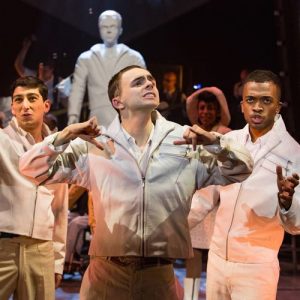I must have seen a dozen Don Giovannis since I last saw one traditionally set in the eighteenth century. And they get ever more ingenious and imaginative. I suppose it says something for the timelessness of this story of hedonistic amorality, revenge and justice. Oliver Platt’s version for OHP is set on a luxurious 1930s cruise ship which provides a certain plausibility as the Don seeks further seductions to add to his list. And Neil Irish’s set gives us a long narrow deck with lots of doors, some of which open to provide mini rooms and most of it slides away to create a communal area for strolling, deck chairs, dancing, quoits and so on.
Ashley Riches is the most imposing looking Don I’ve ever seen. Taller than anyone else on stage, he brings a charismatic loucheness to the role which – unusually – means you can actually see why so many women fall for him, at least initially. He also sings beautifully of course. The seduction aria addressed to Zerlina (Ellie Laugharne – good) and accompanied by James Ellis on mandolin is utterly delightful, not least because it’s so simple and contrasts well with the more complex work, in duet with Leporello (John Savournin) for example. Savournin finds all the right chagrin, loyalty, wonder, distaste and jealousy to the role and the list number is fun with the numbers chalked up on the quoits score board as he goes.
Victoria Simmonds’s impassioned Donna Elvira ensures that the audience feels real sympathy for this woman who has been “ruined” and cast aside. There’s nice work from Lauren Fagan as Donna Anna especially in that nasty rape scene, played partly on stage in this version, at the beginning. It must be quite a challenge to sing when you’re sideways on the floor with your cheek pressing down and a very large actor on top of you. This production doesn’t pull many punches or invite much sympathy for this serial seducer/rapist. The murder of Il Commendatore ( Graeme Broadbent) is pretty graphic too.
Don Giovanni stands or falls on the strength and staging of its ending. Full marks for this one in which Broadbent’s basso profundo avenger is like Stephen Berkoff playing Banquo’s ghost and pretty damn terrifying.
Warm praise too for the costumes. Themed in amber, yellow, beige and dark red the passengers’ clothes are a visual feast, particularly the Chanel- style trousers and Fagan’s pink silk dressing gown. This is a show which looks as good as it sounds. Dane Lam draws huge amounts of finely drawn detail from his orchestra and it’s fascinating to watch the meticulous way he supports singers by mouthing almost every word.
First published by Lark Reviews: http://www.larkreviews.co.uk/?cat=3




